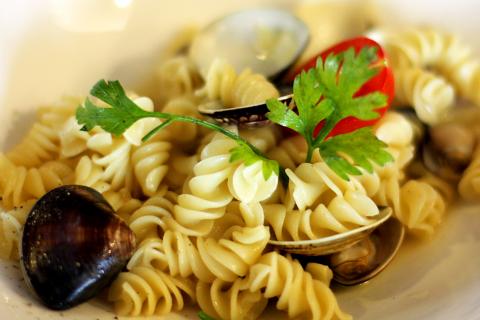Opened last week in Xinyi District’s (信義) new ATT 4 Fun shopping center, Vapiano is the first Taiwan branch of this Germany-based chain of pasta restaurants. Its menu is pricey (pasta dishes range from NT$280 to NT$420), but the corner location offers a great view of Taipei 101 and the landmark’s surrounding plazas.
Vapiano markets itself as a “fresh casual restaurant” with a twist. Customers are given a chip card at the entrance, which they take with them to pasta, salad, pizza and dessert stations. There, the amount of their order is recorded onto the card and their food is prepared in front of them.
The system is meant to allow customers to be served quickly and to spontaneously pick up extras like salads and drinks without having to wait for servers.

Photo: Catherine Shu, Taipei Times
During a busy dinner service on a Monday evening, however, I found that the chip card system meant waiting in line at each station for my food (customers are provided with pagers for items that take longer to prepare so they can wait at their tables). To their credit, the friendly cooks behind each station worked quickly to keep the line moving as quickly as possible.
For my serving of filetto di manzo e rucola (or pasta with strips of beef tenderloin, mushrooms, and rocket salad (arugula leaves) in a white wine sauce, NT$420), I was asked how I wanted my steak cooked, how much garlic and diced chili should be added to the sauce and if I wanted springs of fresh rosemary to be sprinkled on top. (Vapiano grows pots of fresh herbs in the front of the restaurant that are used to garnish almost every dish.)
I was given a pager for my order of carpaccio (thinly sliced raw beef tenderloin with cipriani sauce, Parmesan cheese and rocket salad, NT$320), which took a while to prepare. Carefully arranged with just the right amount of sauce, however, it was worth the wait.
Despite its relatively high price, the quality of Vapiano’s pasta is obvious and all sauces are made with fresh ingredients. At a press event to mark the grand opening of Vapiano’s ATT location, attendees were served pasta topped with pesto, pine nuts and olive oil (NT$280) and rucola ravioli (ravioli stuffed with rocket salad and ricotta cheese and topped with cherry tomatoes and pine nuts, NT$420). Both dishes were delicious, as was the prosciutto e funghi pizza (topped with prosciutto, ham, mushrooms, tomato sauce and mozzarella cheese, NT$360). The insalata Cesare (salad made with romaine lettuce and topped with Caesar dressing and Parmesan cheese, NT$250), however, had a little bit too much dressing.
Vapiano’s desserts include the delicious crema di fragola (NT$150), or fluffy, creamy mascarpone cheese and fresh strawberries topped with a mint leaf. Red and white wines are also available, as well as Moet and Chandon champagne. Diners who want to relax and enjoy the view from the restaurant with friends can reserve a private dining room or tables on the large outdoor dining balcony.

In the March 9 edition of the Taipei Times a piece by Ninon Godefroy ran with the headine “The quiet, gentle rhythm of Taiwan.” It started with the line “Taiwan is a small, humble place. There is no Eiffel Tower, no pyramids — no singular attraction that draws the world’s attention.” I laughed out loud at that. This was out of no disrespect for the author or the piece, which made some interesting analogies and good points about how both Din Tai Fung’s and Taiwan Semiconductor Manufacturing Co’s (TSMC, 台積電) meticulous attention to detail and quality are not quite up to

April 21 to April 27 Hsieh Er’s (謝娥) political fortunes were rising fast after she got out of jail and joined the Chinese Nationalist Party (KMT) in December 1945. Not only did she hold key positions in various committees, she was elected the only woman on the Taipei City Council and headed to Nanjing in 1946 as the sole Taiwanese female representative to the National Constituent Assembly. With the support of first lady Soong May-ling (宋美齡), she started the Taipei Women’s Association and Taiwan Provincial Women’s Association, where she

It is one of the more remarkable facts of Taiwan history that it was never occupied or claimed by any of the numerous kingdoms of southern China — Han or otherwise — that lay just across the water from it. None of their brilliant ministers ever discovered that Taiwan was a “core interest” of the state whose annexation was “inevitable.” As Paul Kua notes in an excellent monograph laying out how the Portuguese gave Taiwan the name “Formosa,” the first Europeans to express an interest in occupying Taiwan were the Spanish. Tonio Andrade in his seminal work, How Taiwan Became Chinese,

Mongolian influencer Anudari Daarya looks effortlessly glamorous and carefree in her social media posts — but the classically trained pianist’s road to acceptance as a transgender artist has been anything but easy. She is one of a growing number of Mongolian LGBTQ youth challenging stereotypes and fighting for acceptance through media representation in the socially conservative country. LGBTQ Mongolians often hide their identities from their employers and colleagues for fear of discrimination, with a survey by the non-profit LGBT Centre Mongolia showing that only 20 percent of people felt comfortable coming out at work. Daarya, 25, said she has faced discrimination since she